Community:Madoka Magica and Faust
Please refrain from reading if you haven't watched the latest episode yet.
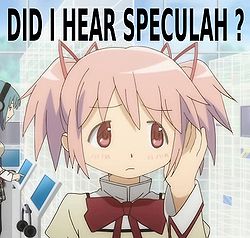
Lines from Goethe's Faust appear widely in Episodes one and two, in writings on walls and in runes which flash across the screen.
Short speculah can be added to the bulleted list for each section, extended analysis can be added under a subheading, eg. "Charater Roles" below.
Parallels
In the opening of the drama, Faust, filled with regrets of his life, laments about his life ending before it has truly begun. He felt that he has little importance in a world that emphasizes not the wealth of knowledge in sages... whereas Madoka, filled with regrets of her short life, laments about her life coming to a point where she is of little importance in a world that requires one to be useful... yet, both Madoka and Faust are actually ambitious and hopeful. They both do not see hedonistic happiness as the most important thing.
Faust heads off brazenly, in the spirit of headstrong ignorance, that he shall seek all the ups and downs of humanity without ever stopping, and he shall fall should he wish time to standstill. Madoka has now seen sorrow and joy in its rawest form, and she now has the opportunity to make the same leap of faith... yet she of course is ignorant.
Madoka, as Faust has, will soon face the issue of her hotheaded ambition being doused time, time and time again. The ill omen strikes in this parallel where, by the second part of Faust, the man becomes resolved to do good via obtaining the means to do so. Although Mephistopheles misinterpreted Faust's intentions as Faust attempting to seize power unto himself, it was not so... which led, unfortunately, to the bloody price that Faust paid to achieve his own Utopia, that land made from sea reclamation; The blood of innocents would yet again trip the mind of the idealist.
Will we see this occur with Madoka, where good intention does not yield the ideal performance?
Faust lives on, with humility of understanding that he is no better than others and that he cannot play god, yet he must live on and continue this journey in the ugly yet beautiful world. Will Madoka come to understand this bitterness and yet still resolve to reach a form of satisfaction, albeit with humility? It remains to be seen. This realization has earned Faust his salvation, yet would that point come with Madoka and would she, in turn, reach her salvation?
In relation to the Faustian issue in the price to be paid for a contract, I now think that Goethe's answer would be that once signed, the moment of lament is over. Moreover, make no assumption that one will gain such tangible benefit and that you are wiser than the other side of the consigning parties by dictating the terms of the agreement. After that, all parties must partake the journey together, as success and failure is now defined, and intertwined between all parties involved.
As Junko applies her makeup, Faust downs the Witche's one-times-one, Madoka must transform into a magical girl and face a world that she has consigned to involve herself in. Everything prior is just prologue. I hope Madoka would solve the Witchs' Epitaph and enter the Golden Land of her choosing.
Episode 1
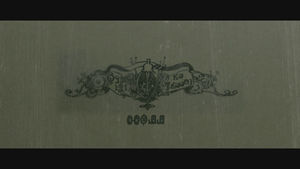
Prologue
The very first shot of the series after the curtains rise is a title card that reads (in runes) "Prolog im Himmel". This is the title of the Prologue of Goethe's Faust, where Mephistopheles and God make a wager over the soul of Faust. The runes underneath the title are assumed to say "2011".
As of episode 4, this is the only direct quote from Faust which appears independently of Gertrud's barrier. In the absence of this Prolog Im Himmel screen it could otherwise be assumed that Gertrud merely studied or enjoyed Goethe's Faust.
- The addition of "2011" may imply that the series does not just reference Faust, but is a full animated adaptation of the story.
Character roles
In Prolog im Himmel, Mephistopheles and God have a conversation about Faust. In the series prologue, Madoka and Kyubey have a conversation about Homura. While it is normally assumed that Madoka is playing either Faust, or the Gretal to Homura's Faust, the placement of characters in this scene presents other possibilities.
That Kyubey is Mephistopheles seems a no-brainer, after all Mephistopheles appeared to Faust as a small cute animal. So we could consider the possibility that Madoka is God. As of Episode three Kyubey, Mami and Homura have all stated that Madoka has massive magical potential, which could be viewed as god-like power. If true, we would expect to see Homura(Faust)'s existing interest in and devotion to Madoka(god) being tested and eventually broken as she loses her way or becomes more corrupt.
The alternative scenario presented by the prologue is that Kyubey is god, and Madoka is Mephistopheles. Certainly Kyubey's ability to grant wishes is godlike, while his animal form may be a red herring. Madoka's journey through the checkered hallways to reach the treetop where she converses with Kyubey may mirror Mephistopheles' journey to reach heaven. Also, the homo erotic subtext between Homura and Madoka parallels the subtext between Faust and Mephistopheles. In this scenario, we might expect Homura's relationship with Madoka to lead her down a path to damnation.
The third scenario would be similar to the first, where Kyubey plays the role of Mephistoheles. Again we see the homo erotic relationship between Homura and Madoka. However, this time it parallels the relationship between Faust and Gretchen, where their meeting would lead the the other to ruin. It is debatable which roles Madoka and Homura fit under for Faust and Gretchen as both fill the requirements for both roles. Madoka as Faust, would ruin Homura(Gretchen's) life through their meeting where Homura is eventually driven to become a magical girl and eventually driving her to near insanity. The more obvious would the reversal in which Homura(Faust) meets Madoka(Gretchen) and through her multiple attempts to save Madoka but fails in each attempt only to burdern Madoka's fate even more thus causing Madoka to eventually fall into despair.
At the end of the series Madoka also doubles the role of the Eternal Feminine when she is in her ultimate magical girl form. Madoka in her ultimate form defeats her witch self saving Homura from her twisted fate and eventually forgiving Homura for her mistakes.
Please also note that Mephistopheles was not always depicted as an evil character. Often he is an unwilling slave to Satan who helps and advises Faust, trying to steer him away from the dark path he is treading.
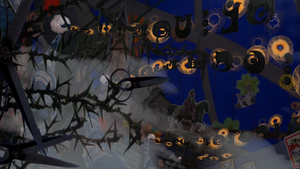
The Witch's spell
After Madoka and Sayaka run away from Homura, four Anthonies are seen to be "speaking", or singing, moving streams of runes which are a quote from "The Hexeneinmaleins" in Goethe's Faust. This quote is a basic magic spell demonstrated to Faust on his first visit to a witch. The "Einmaleins" (literally "one-times-one") is a multiplication table taught to elementary school students. It is also a way of saying "the very basics," similar to "[something] 101" in English.
| Original text | Translation |
|---|---|
| Die Hexe Du mußt versteh'n! Aus Eins mach Zehn, Und Zwei laß geh'n, Und Drei mach gleich, So bist du reich. Verlier die Vier! Aus Fünf und Sechs, So sagt die Hex', Mach Sieben und Acht, So ist's vollbracht: Und Neun ist Eins, Und Zehn ist keins. Das ist das Hexen-Einmaleins! |
The Witch This you must ken (understand) From one make ten, And two let be, make even three, Then rich you'll be. Skip o'er the four! From five and six, The Witch's tricks, Make seven and eight, 'Tis finished straight; And nine is one, And ten is none, That is the witch's one-times-one! |
Other
While inside the witch's barrier cut-out rings containing German text appear which can be assumed to be quotes from Faust, although they are currently unidentified.
Episode 2
Waking up
On the morning after the events of episode 1, Madoka wakes up thinking all was just a dream. Then she notices Kyubey watching her. In Faust I, when Faust and Mephistopheles meet the first time, Mephistopheles makes Faust fall asleep in order to escape despite being trapped by Faust. When Faust awakes, he wonders if it was all just a dream. Then the next scene begins with Mephistopheles knocking on Faust's door.
Gretchenfrage
The Gretchenfrage (German for Gretchen's question) is a center point of Faust I and entered the German language as any kind of question that forces the person towards whom the question is directed to either show his true self, lie or not answer at all. In Faust I, the question is about Faust's relation to religion. He avoid a direct answer.
The most noticeable occurrence of a Gretchenfrage in the series is in episode 2 when Madoka asks Homura what her wish was. Homura chooses not to answer.
Another aspect is the apparent lack of any Gretchenfrage directed towards Kyubey over the course of the whole series. As no one asks him about his motives, the nature of witches or soulgems, he can continue his deception on his own rules of only lying by omission.
Entrance to Gertrud's barrier
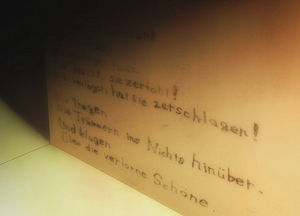
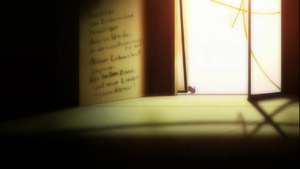
The texts on the abandoned building's entrance wall in episode two are quotes from Goethe's Faust. Here is a translation of the portion that is quoted.
| Original text | Translation |
|---|---|
| Weh! Weh! Du hast sie zerstört, Die schöne Welt, Mit mächtiger Faust; Sie stürzt, sie zerfällt! Ein Halbgott hat sie zerschlagen! Wir tragen Die Trümmern ins Nichts hinüber, Und klagen Über die verlorne Schöne. Mächtiger Der Erdensöhne, Prächtiger Baue sie wieder, In deinem Busen baue sie auf! Neuen Lebenslauf Beginne, Mit hellem Sinne, Und neue Lieder Tönen darauf! |
Woe! woe! Thou hast it destroyed, The beautiful world, With powerful fist: In ruin ’tis hurled, By the blow of a demigod shattered! The scattered Fragments into the Void we carry, Deploring The beauty perished beyond restoring. Mightier For the children of men, Brightlier Build it again, In thine own bosom build it anew! Bid the new career Commence, With clearer sense, And the new songs of cheer Be sung thereto! |
Note that this passage is sung by an "invisible ghost choir". In the series Kyubey, the witches, their minions and barriers are all invisible to normal people.
This may imply that Gertrud is singing the above paragraph, for some reason.
In Faust I, Mephistopheles minions taunt Faust with these lyrics, encouraging him to go out into the world and be that "Mächtiger Der Erdensöhne" (more accurate translation: "Mighty one of the sons of earth") who destroys and rebuilds the world. Multiple interpretations in the context of the series are possible.
Note that the lyrics speak of a mighty one, not the mightiest one. This allows the lyrics to apply to any magical girl, not just Madoka. In this regard, the lyrics mirror how Kyubey sometimes appeals to the girls ambition in order to trick them into making a contract similarly to how Mephistopheles appeals to Faust's ambition. This can also apply directly to Madoka's or Homura's wishes which both involved rejecting the world they were living in in order to create a better one.
Without taking the lyrics' original context into consideration, they is also serve as a foreshadowing to the series' resolution, possibly as seen from Kyubey's perspective. In this interpretation, Kyubey laments the loss of his world of witches and magical girls.
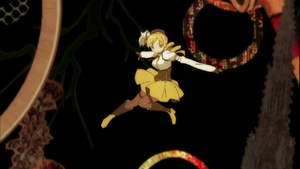
Inside the barrier
As in episode one, cut out rings containing Faust quotes in German can be seen within Gertrud's barrier. One of these is legible, referencing a passage where several things are cursed. Here is the full passage and translation:
| Original text | Translation |
|---|---|
| Verflucht voraus die hohe Meinung, Womit der Geist sich selbst umfängt! Verflucht das Blenden der Erscheinung, Die sich an unsre Sinne drängt! Verflucht was uns in Träumen heuchelt, Des Ruhms, der Namensdauer Trug! Verflucht was als Besitz uns schmeichelt, Als Weib und Kind, als Knecht und Pflug! |
Cursed be, at once, the high ambition Wherewith the mind itself deludes! Cursed be the glare of apparition That on the finer sense intrudes! Cursed be the lying dream's impression of name, and fame, and laureled brow! Cursed, all that flatters as possession, As wife and child, as knave and plow! |
In Faust I, these lines are part of a longer list of curses that appear directly before the lyrics shown at the entrance to Gertrud's barrier.
Here Faust is reflecting on how none of his previous life choices and dreams brought him happiness or satisfaction.
Especially when taking the whole passage into consideration, the lines are reminiscent of a magical girl falling into despair.
Most specifically, the last three curses are toward hope, faith and patience.
Using only the cited lines, other options are possible: The English translation suggests a straight-forward interpretation: Someone (Gertrud?) laments her choice of becoming a magical girl. She curses her ambition and dreams of fame and possessions which made her agree to the contract. However, the original text is more ambiguous.
- The cursed "hohe Meinung", translated as "high ambition", can also mean high opinion. High opinion of whom, maybe Kyubey? In this case the first two lines can be interpreted as the girl cursing her own naiveté toward Kyubey's motives.
- "Blenden der Erscheinung" (glare of apparition) can also mean "deception of the manifestation". Kyubey is basically not a being but the manifestation of a being, involved in the deception of humans.
- The translation of "Verflucht was uns in Träumen heuchelt", "Cursed be the lying dream's impression" contains a subtle difference: In the translation, it is the dream that is lying, in the original, it is "that which is lying to us in dreams". The latter again suggests the involvement of an exterior influence such as Kyubey's.
In summary, both versions lament the choice of becoming a magical girl but it is ambiguous whether the curse is directed inward (the girl cursing her own flaws) or outward (the girl cursing Kyubey's deception).
Episode 3
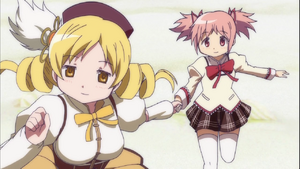
The pinnacle of happiness
After making the promise to fight as friends with Madoka, Mami thinks "It's the first time I've been this happy while fighting." among other extravagant thoughts and actions that expressed her euphoria. Very shortly afterwards she dies. Messily.
As part of Faust's deal with Mephistopheles, should he ever reach the highest state of happiness possible for humanity he will immediately die and be consigned to hell.
- "The curse of happiness" is a theory that any magical girl who achieves this state of happiness will be consigned to death, final-destination style. See Episode 5 below for further evidence.
- Homura is quite likely to fall victim to this curse if her subtext with Madoka bears any fruit.
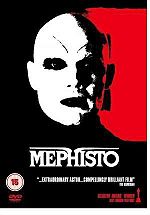
The Witch's Mask
Episode three saw the first airing of the ED for the anime. The last picture shown is that of a childlike Madoka sleeping in the eye socket of a witch's mask.
This mask has been likened to the cover of Mephisto.
Episode 4
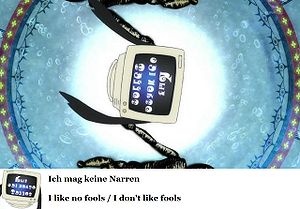
Fools
A phrase which appears in runified German within Elly's barrier is "I don't like fools." (Ich mag keine Narren)
In Faust, Mephistopheles refers to all of humankind as Narrenwelt: "Wenn sich der Mensch, die kleine Narrenwelt (Though folly's microcosm, man)."
- Narren, meaning fool, may refer to humans here, and could signify the witch's dislike for humans.
- In Faust, Mephistopheles criticizes humans for thinking that their microcosm resembles the whole world as they are not generally aware of ghosts and demons. In the series, normal humans cannot see witches or Kyubey.
Episode 5
Ave Maria
The song Kamijou plays is Bach/Gounod's Ave Maria (Video, the anime version is played one octave lower)
Charles-François Gounod was a French composer, known for his Ave Maria as well as his operas Roméo et Juliette and Faust: A grand opera in five acts loosely based on Goethe's Faust, Part 1.
In Goethe's Faust (not the opera), The Holy Mother is invoked to save Faust when Mephistopheles tries to claim his soul.
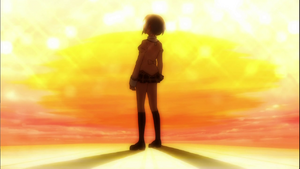
The pinnacle of happiness 2
While listening to Kamijou play, Sayaka thinks "I'm the happiest I could possibly be right now!" The scene immediately switches to Kyoko, who confidently states that she could kill Sayaka in an instant.
At the end of episode five Sayaka would have died if Kyoko had struck her soulgem. This possibility is averted by Homura's intervention.
At the end of episode six Sayaka is almost killed by Madoka. Again her life is saved by Homura. Although the exact effects of separating a magical girl's soul from her body/husk are unknown, Homura's actions certainly expressed a great deal of urgency.
Please see Episode 3 above for the relevance of these events to Faust, and associated theories.
- Without a magical girl's controlling magic, her husk may cease all function and undergo the natural processes of death: cell death, rigor mortis and eventual bio-degradation.
- The possibility of bio-degradation is proven true in Madoka Magica Portable's "Sayaka Route." Sayaka's body begins to rot after being separated from its soul gem for too long, and does not return to normal once the gem is found.
- Assuming that the "curse of happiness" is true:
- Homura may be able to interfere with the curse because of her status as an "anomaly". It is only a matter of time, however, before she fails to save Sayaka.
- Homura appears to be unaware of the curse. Although she states that Sayaka cannot be saved (in the scene immediately after Kyoko's deceleration), it is unlikely she knew that Sayaka had achieved happiness. She is also shocked at Madoka's rash action and goes to great lengths to save Sayaka's life.
- Homura believing Sayaka can not be saved may be due to her inevitably becoming a witch in the other time lines, rather than the happiness theory.
Episode 6
Walpurgis Night
Homura states that "A Walpurgis Night will come to this town two weeks from today." About which Kyoko comments "That'd be pretty hard to handle myself," Note that the original Japanese wording is ambiguous as to whether the "Walpurgisnacht" is an event or a single entity.
In Germany, Walpurgisnacht, the night from 30 April to 1 May, is the night when witches are reputed to hold a large celebration on the Brocken and await the arrival of spring. Variations on these myths claim the witches "hold revels with their gods" or "fornicate with demons/the devil"
A scene in Goethe's Faust Part One is called "Walpurgisnacht", and one in Faust Part Two is called "Classical Walpurgisnacht".
In Part One, Mephisto takes Faust to a Walpurgis festival on Bald Mountain while Gretchen is sentenced to death back home.
- Walpurgisnacht may be a large gathering of witches, or a single powerful witch as seen in the prologue.

Episode 8
The Hexeneinmaleins is one of the documents featured in the Homura Residence.
Sayaka's witch form is a mermaid, supposedly to reflect how her storyline resembles that of Hans Christian Andersen's The Little Mermaid. Andersen's fairy tale is also referenced in German novelist Thomas Mann's retelling of the Faust legend, Doctor Faustus, about a musician, Adrian Leverkühn, who sells his soul and renounces love for greater musical abilities (used as a metaphor for Germany's 20th-century political history). He is told that as a result of his Faustian bargain he is fated to sleep with The Little Mermaid, and she comes into his bed on several different occasions, both with legs (and full of pain) and with her mermaid tail. Besides the fact that both stories draw connections between the Faust legend and The Little Mermaid (as they are both "deals with the devil" that result in tragic consequences for the person who makes them), the boy Sayaka loves and makes her wish to heal has some resemblance to Leverkühn: Gen Urobuchi has said that Kyousuke would never make Sayaka happy because she would always come second to his music, similarly to how Leverkühn literally sacrificed love for his music.
Sayaka's demise is also similar to Gretchen's plight: Both begin their journey overly idealistic and ultimately lose their sanity when they cannot live up to their own high moral standards. Both end traped in a kind of dungeon. There both are visited by someone dear to them (Madoka/Faust) and someone they viewed as their antagonist (Kyoko/Mephistopheles). Both refuse any kind of help and only find salvation in death.
Episode 9
Homura is shown to be capable of stopping time. In Goethe's Faust, the title character would lose his soul if he ever wished for time to stop in a moment of perfect happiness.
Episode 10
In the fourth timeline, Madoka's witch name was revealed as Kriemhild Gretchen. In Part One of Goethe's Faust, Gretchen (also known as Margarete) is the name of Faust's first lover. This implies that Homura is the Faustian character of this story who took Mephistopheles' bargain. In Goethe's story, Gretchen loses her mother and brother, becomes pregnant with Faust's illegitimate child, goes insane and kills their illegitimate child, and then is taken to a dungeon to be executed for her crime. Faust attempts to rescue Gretchen from the dungeon, but she refuses to go with him. Part One ends with Faust and Mephistopheles leaving without Gretchen, while voices from heaven pronounce that Gretchen is saved.
Gretchen reappears at the end of Part Two as a penitent in Heaven. She offers to lead Faust's redeemed soul into the higher spheres. Her request is granted. The story then ends.
As an added note, Kriemhild means "battle mask". The last scene of the ED has Madoka floating in the fetal position (incubating?) in the eye of a mask.
Madoka's weapon of choice is revealed to be a rose bearing bow-and-arrow. In the second part of Faust, the angels use rose petals to ward Mephistopheles off from stealing Faust's soul.
Episode 12
Madoka's role of guiding magical girls to the afterlife is similar to Gretchen offering to guide Faust's soul into heaven.
The virgin Mary of Goethe's Faust's is regarded as God within the story, including giving her the job of saving souls and being called a goddess. Although the general Christian themes of Faust may have inspired the idea of Madoka sacrificing herself for the sake of others, it's also possible the inspiration was taken specifically from the story.
Relation with Prism Nana
This speculation contends that if Madoka Magica can be regarded as the first part of Goethe's Faust, then SHAFT's upcoming PRISM NANA PROJECT might be the second part, featuring the homunculus who wants to become a human. In Prism Nana, the main character Washioka Itaru wears a screw-shaped hairpin, which might symbolize that she's an artificial being (like a homunculus). Her magical form is associated with fire; Paracelsus equated life with fire, and it's not uncommon to associate fire with the creation of life in alchemical processes.
In Faust the homunculus is accompanied by the Greek philosophers Anaxagoras and Thales. Their Prism Nana counterparts might be the two other main girls, Asagi Asuka and Oribe Kotone. Asagi wears seed-like hairpins in her transformed form, and uses a bow as her weapon; in Anaxagoras' theories, all matter arises from "the seeds of all things," which were separated from the original infinite "Whole" by nous (the Mind). Asagi's seeds might be a reference to the "seeds of all things," and the bow held in her left hand (which can be seen in the PV) is a symbol of wisdom which is related very closely to the concept of nous. In this case, Kotone would be Thales. Kotone has the power over water, and uses an electric guitar as her weapon; Thales' most notable theory contended that all matter arose from water. Thales also attempted to prove the existence of "life" in supposedly inanimate objects by pointing to the electrical attraction of lodestone and amber, which could be a distant origin of Kotone's electric guitar.
It's also interesting that the anime is called Prism Nana, when Goethe spent a large part of his life trying to disprove the theory that white light is composed of multiple colors of light.